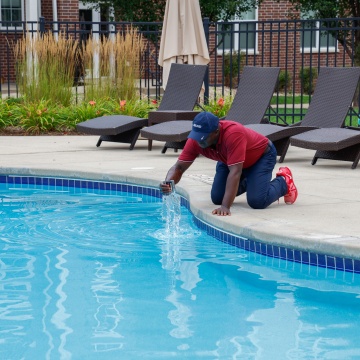Pools

We license and inspect over 400 public swimming pools and water attractions to help keep you safe.
Look up a health inspection report
- These reports give you information on the conditions we saw at the time of inspection.
- Our reports may not reflect actions the establishment made to correct issues, or the current condition of the pool.
How to get a license for a new pool or change of ownership
To apply for a license for a new pool or when there is a change of ownership:
- Check the license fees. Complete a pool license application and send it to the City Clerk’s office with payment. Fees and application must be mailed or paid in person at the Madison City Clerk's Office.
- Contact a public health sanitarian at 608-242-6515 or LEadmin@publichealthmdc.com for a pre-inspection before opening to the public.
About your license
- Licenses are valid each year from July 1 to June 30. Each license we issue expires on June 30. Licenses issued after April 1 will be valid until June 30 of the following year. For example: A license issued on April 1, 2024 will expire on June 30, 2025.
- You need to renew your license each year. We will mail a renewal to you. You need to return it with your payment before June 30 of each year.
Prerequisites for new pool construction
- Before building a new public swimming pool, plans must be approved by the Wisconsin Department of Safety and Professional Services.
- Chapter SPS 390 of Design and Construction of Public Swimming Pools and Water Attractions, Wisconsin Administrative Code Renewing Licenses
You need to renew your license each year. We will mail a renewal to you. You need to return it with your payment before June 30 of each year.
We want to better serve you! Fill out our 2-minute anonymous feedback survey about your health inspection.
Safety, maintenance, and operation of public pools, spas, and water attractions
Pool & Spa Disinfection
Disinfection means removing bacteria, parasites and viruses from the water by sanitizing the pool water. Chlorine is the most common disinfectant used in swimming pools and spas.
Fecal, Vomit, or Blood Incidents
- You must disinfect when there is a fecal, vomit, or blood accident in the pool water.
- Close the pool and follow CDC Fecal Incident Guidelines. For blood or vomit, follow the same steps as for formed stool incidents.
- Document the incident on the DATCP Fecal, Vomit or Blood Incident response form. Incident forms must be kept for at least 2 years.
Pool Deck or Surface Disinfection
- When blood, vomit, or feces ends up on a pool surface or deck, the area must be cleaned and disinfected immediately to prevent the spread of illness.
- Block off the area and follow the CDC Body Fluid Spills on Pool Surfaces steps.
Pool & Spa Water Testing
- Periodically, we may collect a water sample from a public pool for routine testing. Bacteria can grow in pool water when disinfectant levels are below the minimum requirements and/or the pool filtration system is not working properly. Unsatisfactory water test results are indicators that the pool is not being properly maintained.
- A water test is unsatisfactory if coliform bacteria, E. coli bacteria, or Pseudomonas aeruginosa bacteria are present.
Unsatisfactory Water Test Disinfection Steps
- If your facility’s pool or spa has had a pool water test come back positive for the presence of E. Coli or coliform bacteria, follow the steps listed in the CDC Diarrheal Incident Response Guidelines.
- If your facility’s pool or spa has had a pool water test come back positive for the presence of Pseudomonas aeruginosa, follow the steps listed in Disinfection of Pools and Spas for Pseudomonas aeruginosa.
- The pool/spa may reopen once you have followed the disinfection steps and chemical levels are back in approved ranges. For coliform present test results, no further notification is required to us. For E. Coli or Pseudomonas aeruginosa present test results, contact your assigned sanitarian or email us to say the pool water has been disinfected and the pool is reopened. The sanitarian will coordinate a resample of the pool water.
Learn More & Resources
Pool Operation
- Chapter ATCP 76 Safety, Maintenance, and Operation of Public Swimming Pools and Water Attractions, Wisconsin Administrative Code
- Virginia Graeme Baker Act fact sheet and log sheet
- Information for Pool Operators, CDC
- Incident Reporting Forms, DATCP
Courses for Certified Water Attraction Operators
- Aquatic Facility Operator Certification Program, National Recreation and Park Association
- Certified Pool/Spa Operator Certification Program, Pool & Hot Tub Alliance


